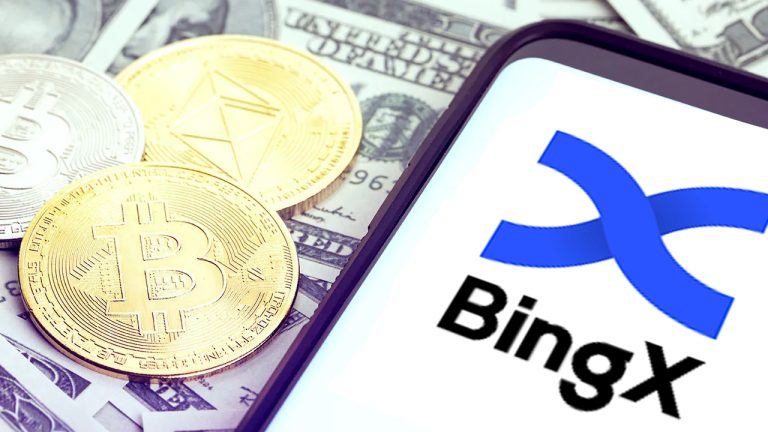 Bingx said it has resumed withdrawals for “mainstream” cryptocurrencies including bitcoin, tether and ethereum among others. However, the exchange has warned of potential delays due to security reviews. The crypto exchange said it will gradually restore withdrawal services for other cryptocurrencies but has canceled pending requests. The exchange’s chief product officer expressed concern about the […]
Bingx said it has resumed withdrawals for “mainstream” cryptocurrencies including bitcoin, tether and ethereum among others. However, the exchange has warned of potential delays due to security reviews. The crypto exchange said it will gradually restore withdrawal services for other cryptocurrencies but has canceled pending requests. The exchange’s chief product officer expressed concern about the […]
New data from prominent blockchain security firm Cyvers reveals that a Singapore-based crypto exchange lost $52 million after being hacked. In a new post, Cyvers says that BingX’s hot wallet suffered a multimillion-dollar exploit affecting multiple blockchains, including Ethereum (ETH), Avalanche (AVAX), BNB, Optimism (OP), and Polygon (POL), Base, and Arbitrum (ARB). “Our system has […]
The post Singapore-Based Crypto Exchange BingX Suffers $52,000,000 Hack: Blockchain Security Firm appeared first on The Daily Hodl.

Monetary losses from the BingX hack were initially reported as totaling $26 million, but the figure has since swelled to $52 million.
BingX — a popular cryptocurrency exchange — has announced that withdrawal services on the platform will resume on Sept. 21, 2024, for certain digital assets.
According to the exchange's announcement, withdrawals for Tether's US dollar stablecoin (USDT), Circle's US dollar stablecoin (USDC), Bitcoin (BTC), Ethereum (ETH), Tron (TRX), and Solana (SOL) will resume first followed by withdrawal services for other tokens and digital assets over the next two weeks.
The exchange notified customers that deposit services would likewise resume in the next several weeks and told clients that withdrawal requests submitted before the disruption of withdrawal services have been canceled and must be resubmitted.
 Asian crypto exchange Bingx suffered a hacking attack, leading to a suspension of withdrawals and an estimated loss of $52 million. Bingx claims the stolen amount is minimal because it primarily stores users’ assets in cold wallets, which were not targeted by the hackers. A security firm believes a North Korea-linked hacking group, Lazarus Group, […]
Asian crypto exchange Bingx suffered a hacking attack, leading to a suspension of withdrawals and an estimated loss of $52 million. Bingx claims the stolen amount is minimal because it primarily stores users’ assets in cold wallets, which were not targeted by the hackers. A security firm believes a North Korea-linked hacking group, Lazarus Group, […]
A Singapore-based crypto exchange is launching a new platform to support up-and-coming digital asset projects. In a new press release, BingX says it’s launching BingX Labs, a new crypto project incubator that aims to help up-and-coming crypto projects with high potential efficiently distribute their tokens. According to the press release, BingX is interested in projects […]
The post Singapore-Based Crypto Exchange BingX Launches New Crypto Project Incubator, BingX Labs appeared first on The Daily Hodl.
 Chelsea Football Club and their principal partner, Bingx, say they have taken their partnership to the next level. Bingx, a leading cryptocurrency exchange, has transitioned from being a sleeve partner to becoming the official training wear partner for Chelsea’s men’s team. Fans worldwide will now see the Bingx logo on the team’s training apparel for […]
Chelsea Football Club and their principal partner, Bingx, say they have taken their partnership to the next level. Bingx, a leading cryptocurrency exchange, has transitioned from being a sleeve partner to becoming the official training wear partner for Chelsea’s men’s team. Fans worldwide will now see the Bingx logo on the team’s training apparel for […] Several cryptocurrency firms are stepping up to support flood victims in Southern Brazil. For example, Okx has partnered with Brazilian cryptocurrency exchange Foxbit to match donations of up to $10,000 to the “Ajude o Rio Grande do Sul” emergency campaign, channeling funds to non-governmental organizations (NGOs) in the affected areas. Similarly, Bingx is doubling cryptocurrency […]
Several cryptocurrency firms are stepping up to support flood victims in Southern Brazil. For example, Okx has partnered with Brazilian cryptocurrency exchange Foxbit to match donations of up to $10,000 to the “Ajude o Rio Grande do Sul” emergency campaign, channeling funds to non-governmental organizations (NGOs) in the affected areas. Similarly, Bingx is doubling cryptocurrency […] PRESS RELEASE. BingX, the Singapore-based crypto exchange, is pleased to announce the launch of a new category to optimise its trading system for the Shanghai Ethereum upgrade. This move is aimed at helping traders looking to make a profit during the Ethereum upgrade that is expected to arrive on April 13th. The Shanghai Ethereum upgrade […]
PRESS RELEASE. BingX, the Singapore-based crypto exchange, is pleased to announce the launch of a new category to optimise its trading system for the Shanghai Ethereum upgrade. This move is aimed at helping traders looking to make a profit during the Ethereum upgrade that is expected to arrive on April 13th. The Shanghai Ethereum upgrade […] Amid the crackdown against Tornado Cash, associated addresses, contributing developers, and anyone who uses the mixing platform, the project’s governance token called TORN has shuddered in value. TORN is an ERC20 with a fixed supply that is leveraged for governance proposals and voting. During the last seven days, the Tornado Cash governance token has lost […]
Amid the crackdown against Tornado Cash, associated addresses, contributing developers, and anyone who uses the mixing platform, the project’s governance token called TORN has shuddered in value. TORN is an ERC20 with a fixed supply that is leveraged for governance proposals and voting. During the last seven days, the Tornado Cash governance token has lost […]
"Derivatives provide opportunities to protect their portfolios during times of heightened market volatility," says Emerson Li, brand lead at BingX.
The 2022 cryptocurrency bear market has been the worst on record as most Bitcoin traders are underwater and continue to sell at a loss. In response to the rapid decline of token prices, some investors have fled to safe-haven assets; some have exited the market completely and others have perplexingly turned to the enigmatic market of crypto derivatives.
With regards to this, Cointelegraph spoke to BingX's brand lead Emerson Li. BingX is a Singaporean social-based cryptocurrency exchange known for its leaderboards where users can compete with others for returns on investments as well as share ideas among their followers. The exchange processed around $319 million in trading volume within the past 24 hours, mainly consisting of derivates. Regarding the recent market downturn, here's what Li had to say:
"BingX's users are also proliferating; compared with Q1 2022, Users number increased by 70% in the second quarter, and transaction volumes doubling since this round of slumps. We believe that its demand for derivatives is still increasing because it allows users to profit from falling prices, a feature that other products do not have."
During bear markets, traders can purchase derivatives known as put options to either hedge their positions or speculate that the value of underlying tokens will fall. While this can be done by simply shorting the coin, violent and periodic bear market rallies can lead to theoretically infinite losses on one's short position. In addition, a lack of liquidity for borrowing coins to short may lead to exchanges charging high-interest rates on one's positions. On the other hand, the put buyer's losses are theoretically limited to the premium they paid for the derivative, and there are no additional interest fees.
Li went on to explain that BingX is also seeing a sharp increase in deposits as of late. "Since high market volatility is suitable for the derivatives market, we see more users participating in such transactions and stimulating more demand for deposits."
Money also appears to be flowing back to CeFi products from DeFi protocols. "For high-risk products such as DeFi staking, we believe traders have panicked under the recent market, affected by the Terra (LUNA) — since renamed Terra Classic (LUNC) — affair and the problems with many DeFi protocols. Users' risk appetite has decreased, and demand has declined," said Li.
Indeed, dYdX, a decentralized crypto exchange known for its margin and perpetual contract products, saw its weekly trading volume fall approximately 90% from the $12.5 billion witnessed from Oct 24 to Oct 30 last year. However, the trading volume is still several magnitudes higher than one year ago, partly due to the aforementioned risk-hedging tailwind.
Risk-wise, it would appear that the worst is over as a spike in liquidations on dYdX, mainly in the Ethereum and Bitcoin markets, has dissipated since mid-June. Experts from Glassnode noted tokens held in wallet addresses by both new investors and crypto whales had been increasing meaningfully amid the sell-off.